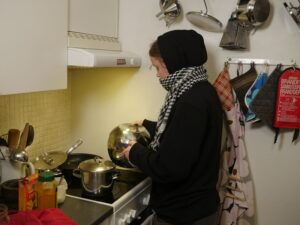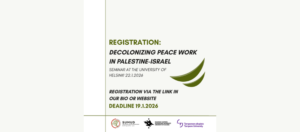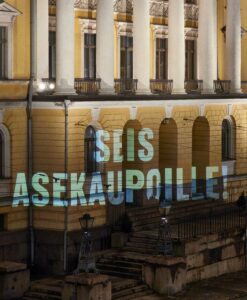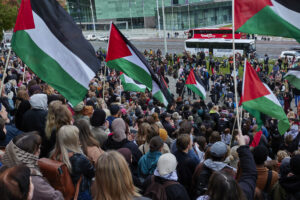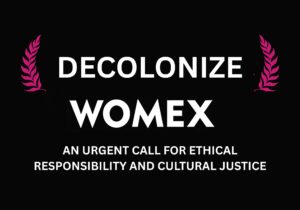The University of Jyväskylä violates the principle of academic freedom
29/11/2024, 17:16Syksy Räsänen speaks at Eurooppa-sali in Helsinki.
The lecture on the academic boycott of Israel on Friday 29.11. at 2pm has been cancelled by the University of Jyväskylä. The lecture will instead be held in the Wolmar Hall of the main library of Jyväskylä. Räsänen is the chair of the Finnish branch of the Israeli human rights organisation ICAHD and vice-chair of Sumud – The Finnish Palestine Network.
The University of Jyväskylä has justified the cancellation of the event by arguing, among other things, that the academic boycott of Israel should not be discussed at the university because it would give the impression that the university is in favour of it.
“It is unacceptable that the University of Jyväskylä management says that it is not allowed to talk about an issue inside the university if the university does not have a policy on it. The idea that things have to be approved by the management before they can be discussed does not belong to a free academic community, but to completely different authoritarian systems,” says Räsänen.
Earlier, Aalto University also cancelled a hall reservation made by Räsänen for a speech on the same topic.
The University of Jyväskylä has also justified the cancellation of the lecture on the grounds that it could cause feelings of insecurity.
“The purpose of universities is to promote critical thinking and enable informed debate on challenging topics – not to shy away from complexity or controversy,” says Iballa Burunat, a Postdoctoral Researcher at the University of Jyväskylä. “I want to learn about the boycott, understand the rationale behind it and question my views. This is exactly what universities are there for: to shape enlightened and well-informed individuals.”
In Finland, the autonomy of universities is guaranteed by the constitution, in particular Article 16(3), which protects academic freedom in research, teaching and higher education. This legal framework ensures the independent functioning of universities without political interference, and the European Court of Human Rights confirms the protection of freedom of academic expression.
Academic boycotts against Israel have been the subject of much debate in Finland and abroad in the recent months. Recently, the University of the Arts committed to a partial academic boycott and last spring the University of Helsinki froze its exchange programmes with Israel. This autumn, UN experts have also called for an academic boycott of Israel.
Also before a Palestine-related event has been cancelled at the University of Jyväskylä
The University of Jyväskylä (JYU) has cancelled a Palestine-related event already twice this year, raising serious concerns about its commitment to promoting open and inclusive academic debate. The first cancellation took place in February, when a planned research panel on Palestine solidarity and repression in the academy was cancelled. The event was planned to be a hybrid seminar that would have been sent to several universities, including JYU. The speakers included Professor Gavan Titley from Maynooth University and Assistant Professor David Landy from Trinity College.
“When the debates are about serious violations of international law, they are not just political but legal issues. Universities have a duty to respect human rights and international law,” says Lauri Hannikainen, Professor Emeritus at the University of Helsinki. “Israel has flagrantly violated international law, and the International Court of Justice has ruled that Israel’s occupation of the Palestinian territories is illegal and therefore Israel must withdraw from them – including the settlements. JYU is acting in violation of international law if it bans a meeting to discuss an academic boycott against Israel.”
Although this was a scientific event, the JYU administration considered it to be political and therefore inappropriate for university premises.
“However, despite requests, the university did not present a formal policy banning political events. This raises serious questions, especially given JYU’s history of hosting events involving prominent domestic and foreign political figures, where the political nature of these events is undisputed,” says Räsänen.
This year, for example, Estonian President Alar Karis gave a lecture at JYU’s long-running Martti Ahtisaari series entitled “Our strength is the road to peace, weakness brings more war”. The lecture dealt with sensitive topics such as Russia, security and foreign relations. By the same logic, a panel of academics discussing academic repression of the Israeli-Palestinian conflict is no more political than discussions of the war between Russia and Ukraine.

